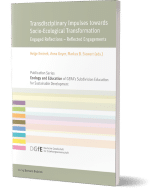Transdisciplinary Impulses towards Socio-Ecological Transformation
Engaged Reflections – Reflected Engagements
edited by Helge Kminek, Anna Geyer und Markus B. Siewert
About the book
Education for sustainable development should enable people to think and act in a way that is fit for the future – in the face of challenges such as climate change, environmental degradation, loss of biodiversity, poverty and inequality. How can different disciplines address this task? In this volume, academic interdisciplinary contributions from philosophy, social sciences and education are complemented by transdisciplinary contributions from practical fields (e.g. museum education, journalism). The current contributions provide impulses for reflection and open up spaces for thinking in order to do justice to the complexity of the task of socio-ecological transformation.
Reading sample: pp. 51-54
Education for Sustainability as a Critical Theory of the Social Relationship to Nature
Christian Stache
1. Introduction
Since the 1990s, the concept of “Education for Sustainable Development (ESD)” (introducing Overwien 2014) has experienced a rapid rise. According to the “National Action Plan for Education for Sustainable Development”, its focus is on the acquisition of skills that should enable the individual to behave in a way that is conducive to sustainable development. In concrete terms, for example, alternative forms of mobility and consumption and values such as “generational justice” are to be practised (National Platform Education for Sustainable Development 2017: 7-8).
Reflecting and changing one’s own way of life is by no means in toto wrong. The transition to a sustainable form of society also requires a civil society cultural revolution of the way of life. But ESD misses the actual problems of the current social relationship with nature, such as climate change or the social relationship with animals. I will only mention two main points of criticism here (for a detailed critique of the ESD programme see e.g., Kehren 2016).
Firstly, the social relations of exploitation and domination, as they exist in particular in socio-economic production relations, as the cause of the destruction of nature and social antagonisms in our society (cf. e.g., Burkett 1999; Foster et al. 2010; Stache 2017) fall outside the ESD grid. The same applies to their reflection and criticism. This problem can be traced back to the birth of the concept of sustainable development (cf. Brand & Görg 2000).
Secondly, the ways out of a non-sustainable society are being shortened in accordance with the insufficient understanding of the problem to paths of ecological modernisation of the existing relations of exploitation and domination. On the Internet portal “Education for Sustainable” Development of the German Commission for UNESCO it says, for example a social transformation towards sustainable development “requires strong institutions, participatory decision-making and conflict resolution, knowledge, technology and new patterns of behaviour” (German Commission for UNESCO n.a.). The revolution of political economic relations and structures, through which nature in our present society is despotically appropriated and over-exploited in the production of goods, is not on this list, nor are the relations and structures of domination in state and society. But if these are excluded, the transition to a sustainable society becomes the transformation to an ecologically modernised, capitalist society.
If ESD education is for the ecological modernisation of capitalism and, therefore, inadequate to understand the causes of the destruction of nature and social contradictions and to outline how to overcome them, what would be the alternative? In the following it is argued that a critical theory of the social relation to nature would be one.
What this essentially consists of and why it requires a forward-looking return to the Marxist programme of political economy is outlined in the next section. Subsequently, using the model of Donna Haraway’s postmodern philosophy and her concept of naturecultures, it will be developed that a certain negation of ideologism is necessary for a critical theory of the social relationship to nature in keeping with the times. Its purpose is to contain the overemphasis of cultural and ideological theory in current social criticism and to understand real socio-natural developments. In a second step, with reference to the socio-relational theory of capitalism, it will be shown that the relationship between bourgeois society and nature should be conceived as a dialectical contradiction if the current destruction of nature is to be understood and a practice developed to halt climate change or animal goods production and to solve the socio-ecological crisis as a whole. Finally, in the last chapter, some ideas are presented on how the bourgeois state and the dualism of nature and society could be understood within a critical theory of the social relationship to nature.
2. Outlines of a Critical Theory of Social-natural Conditions
A critical theory of social natural relations means at least three things. First, the mutual relationship between society and nature must be presented in its historically specific, socio-economic and political-cultural depth structure. Secondly, its representation should be used to criticise the deep structure. Thirdly and finally, the critical theory of the social relationship with nature should be able to indicate how and by whom the current bourgeois social relationship with nature can be changed in order to reconcile society and nature with each other. An education for sustainability was based on the findings of such a critical theory of the social relation to nature. Its programme, outlined here like a woodcut, is also the programme of Marxist Kapital. Today it is necessary to return to it for at least three reasons.
Although it is certainly part of the theory and critique of social relations to nature to demystify naturalizations of social and socio-natural relations – the main concern of critical cultural and ideological theory – it is firstly impossible to explain in this way why, how, by whom and in whose interest the various destructions of nature can be produced and overcome. Criticism of culture and ideology is not enough to fully understand problems such as the greenhouse effect or the so-called livestock farming and the class struggles to shape, continue or end them. For this we need the classical political economy.
Moreover, we find ourselves in a new historical constellation that requires a reflection on the previous significance of ideology and cultural criticism for critical social theory. Adorno (1973: 15) once argued that philosophy kept itself alive “because the moment of its realisation was missed”. “After philosophy has broken the promise that it is one with reality or is about to be created, it is forced to criticise itself ruthlessly” (ibid.). In the middle of the last century, Adorno thus justified the necessity of ideology and cultural criticism as (auto)correction, expansion and perhaps as Marxism’s measure of survival without alternative, by saying that the revolution had failed. Critical theory was, therefore, forced to reflect on why this was the case. But, and this is my second argument, it is time to reflect again on ideology and cultural criticism in the light of the current situation in which the ruling forces have integrated democratic elements of cultural and ideological theory in the sense of “progressive neoliberalism” (Fraser 2017: 46). If liberal cultural theory has been adapted by the ruling bloc to reform politics, culture and thinking in such a way that exploitation and domination are consolidated rather than relaxed, ideology and cultural criticism cannot continue as it has been until now.
The third argument in favour of a return to the Marx programme arises from the interaction between the first two. Today, capitalist development confronts us not only with the integrative recognition (Hawel 2007: 125) of groups of subalterns into the Western cultural and political establishment by means of cultural pluralization and individualization. It also forces us to confront what in the first instance is not discursive, symbolic, ideal, pictorial, theoretical, etc.: the socio-economic practice of society and the practice of nature. According to the Swedish human ecologist Andreas Malm (2018), with the greenhouse effect at the latest, these have brought about a new quality in social development and in our relationship with nature, which the majority of society on the planet cannot ignore on pain of their own demise. “History has sprung alive, through a nature that has done likewise,” Malm writes (ibid.: 11). Climate change “represents history and nature falling down on society” (ibid.: 15). Malm calls this new historical-natural constellation “the warming condition” (ibid.: 1). The concepts of cultural and ideological theory do not suffice to change the terminology. What is needed here are the natural sciences as well as the Marxian critique of economics and especially those terms that describe the social as class structure and the sphere of production. The place where human society and nature in practice have always been in mutual exchange and where the modern greenhouse effect was created.
A return to the Marxian programme does not, it should be explicitly noted here, mean the replacement of cultural and ideological theories by political economy. Rather, it is about turning away from “ideologism” (Gramsci GH 3: 494) – the complement of “economism” – i.e., from the overemphasis on culture, politics, ideology, philosophy etc. and their extensive disconnection from economics in the analysis and critique of social and natural development. Furthermore, the aim is to define more precisely the relationship between political economy and ideology and cultural theory and vice versa. In other words, natural and socio-historical development gives rise to at least three requirements for a critical theory of the social relationship to nature. It requires the certain negation of ideologism, the reappropriation of political economy and the reconfiguration of political economy and theory of culture and ideology. In the following, I will present in a very condensed way how the first two tasks of a critical theory of social natural relations could be created. The third will be formulated here only rudimentary ideas.
***
Would you like to read more?
 Order via our webshop
Order via our webshop
Transdisciplinary Impulses towards Socio-Ecological Transformation. Engaged Reflections – Reflected Engagements
by Helge Kminek, Anna Geyer und Markus B. Siewert (eds.)

